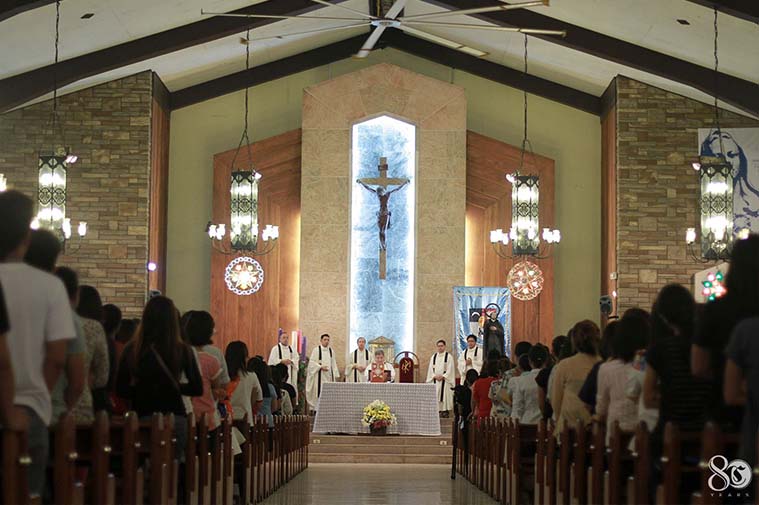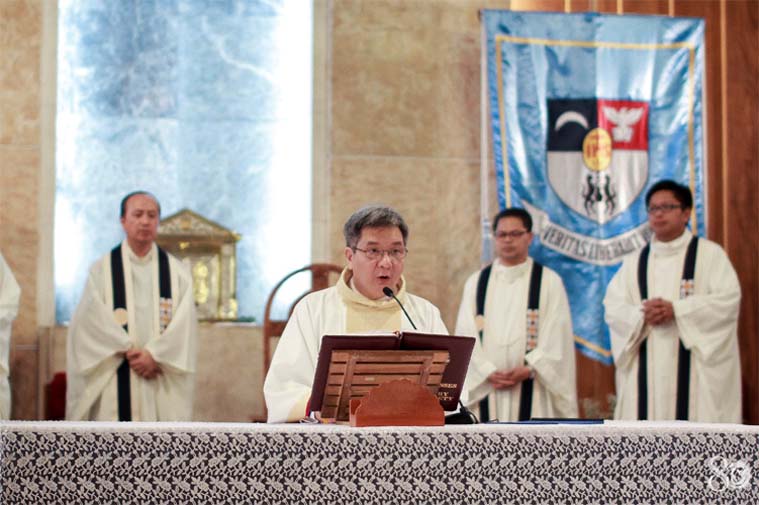"If for St Francis Xavier, home meant: Spirit, Friends, Magis, then for Xavier University, our common home must also mean: Spirit, Friends, Magis."

[OPENING THE CELEBRATION. This homily was delivered by Fr Roberto "Bobby" C Yap SJ, president of Xavier University, at the opening mass for XU Festival Days 2015 with the theme "Xavier: Our Common Home" on December 2 at the University Church of the Immaculate Conception of the Blessed Virgin Mary. Lensed by AP Yao of The Crusader Publication]
Our common home. This is the theme of Xavier Festival Days 2015. Our common home. Since these festival days are a celebration of the feast of the Jesuit saint after whom our university is named, I would like to invite you to reflect with me on what "home" meant for St Francis Xavier. I would like to suggest that for San Francisco Javier, "home" meant three things:
• First, home for Xavier was living with the Spirit;
• Second, home for Xavier was being with friends; and
• Third, home for Xavier was wherever magis could be found.
My dear brothers and sisters, for Xavier, home meant: Spirit, Friends, Magis.
First, "home" means Spirit. Xavier was at home with the Spirit.
Francis was an indefatigable missionary in India and Japan, and it was his life in the Spirit of Jesus that gave him zeal and energy for his strenuous missionary activities.
A companion of Francisco Javier who journeyed with him, recorded that he could see Xavier at night on his knees, arms uplifted, before a little crucifix made of wood. Then after a little rest, he would be up before dawn to say his Office and his Mass.
"I went about with him for six or seven years on the Fishery Coast. No human being could have done what he did or have lived as he lived without being full of the Holy Spirit. Indeed, his life was more that of a saint and angel than of a man."1
Through his years of tireless ministry he proceeded with an overwhelming trust in God. Xavier wrote:
"I feel it incumbent upon me to sacrifice my temporal life for the sake of the spiritual life of my neighbor, and so, putting all my trust in God our Lord, I have offered myself to danger and death in whatever shape it may come, longing as I do to be conformed in my own small and feeble way to the saying of our Redeemer, 'He who wants to save his life, will lose it, who loses his life for my sake, will find it.'"2
My dear friends, we can truly say that for Francis Xavier "home" was living with the Spirit of Jesus.
Second, "home" means friends. Xavier was at home with his friends in the Lord.
When Xavier said goodbye to his best friend, Ignatius, on March 15, 1540 as he left from Rome for Asia, that was the last time they saw each other. He never saw again his dearest friends, Ignatius Loyola and Peter Faber.
For the 12 years he was on mission in the Far East, Francisco felt the physical absence of his brother Jesuits, but at the same time he maintained strong ties and bonds with them through letters and prayer. He wrote 167 letters, many to the Jesuits in Europe and he eagerly awaited letters from them. Snail mail sent by sea kay wala pa may airmail, Internet, email, Facebook, Viber, Instagram ug Twitter niadtong panahona. In several of his letters he explicitly asks his Jesuit brothers to pray for him.
"For the love of Christ our Lord and of his most blessed Mother and of all the saints in heaven, I ask you, my dearest Brothers and Fathers, that you be particularly mindful of me and continuously commend me to God, since I live in such great need of his favor and assistance. I have great need of your continual spiritual assistance, for from much experience I have come to know that God our Lord has, through your intercession, helped and assisted me in many toils of body and spirit."3
Union with his friends in the Lord through prayer and through letters remained essential for Xavier, not just for his own support and satisfaction, but also for the accomplishment of his mission. In a famous letter, he affirms his strong love and union with his separated brothers. He keeps their names near his heart.
"So that I may never forget you and ever have a special remembrance of you, I would have you know, dearest brothers, that for my own consolation I have cut your names from the letters which you have written to me with my own hands so that I may constantly carry them with me together with the vow of profession which I made because of the consolations which I receive from them. I give thanks first of all to God our Lord, and then to you, most dear Brothers and Fathers, for the fact that God has so made you that I derive such great consolation from bearing your names. And since we shall soon see each other in the next life with greater peace than we have in this, I say no more."4
Good friends, there is no doubt "home" for Francis Xavier was being with his brothers, with his community, with his friends in the Lord.

[XAVIER'S JOURNEY. Fr Bobby enchants the XU community members and guests with tales of St Francis Xavier's mission as a Jesuit in the Far East and his relentless pursuit to spread the Holy Gospel. Lensed by Jigo Racaza of The Crusader Publication]
Third, "home" means magis. Xavier was at home wherever magis could be found.
Francis was ever searching for the magis. Xavier was sent not only to India, but also to the larger area of the Far East (what we would refer to today as Asia-Pacific). After almost 8 years in India, the search for the magis led him to explore the possibilities of mission work in Japan. He had heard of the advanced cultures of the people there, “a race with great desire for knowledge.”5 This would not be simply another few days’ journey from India, but an arduous journey of several thousand miles further east from India.
As he began work in Japan he changed his missionary style and tactics. He changed his dress, no longer appearing in the guise of extreme poverty because
“He realized that by appearing miserably clad and scornful of self, he not only did not further his plans for God’s honor but positively hindered them. The Japanese, true to their penchant for ceremonial and public marks of esteem had no conception of the meaning of humility and mortification (as practiced by Xavier). For that reason he decided from now on to dress and behave in another manner.”6
To see an important Japanese leader, he brought gifts and clothed himself with the garb of the educated. Moreover, this shift can be characterized as a move from mass conversions in India, to dialogue and interchange with the religious traditions of Japan.
From Japan, Xavier wanted to proceed further in his quest for the magis. He set his sights on China, having heard of the potential there for the Gospel. China was highly praised by the Japanese whom he got to know and respect. He heard that Japan had received much of its wisdom from China, and he reasoned that if China were converted, then conversion in Japan would be easier. He had high hopes for missionary work in China, and hoped that eventually many Jesuits would go there. Of course, this was not to be, and he died on the desolate island of Sancian at the Bay of Canton in sight of his destination. Francis looked lovingly toward China, not knowing that his missionary days were over. On December 3, 1552, Xavier returned home to the Lord.
My sisters and brothers, "home" for Xavier was wherever the magis could be found, wherever he could do more for Christ, wherever he could serve God’s greater glory.
If for St Francis Xavier, home meant: Spirit, Friends, Magis, then for Xavier University, our common home must also mean: Spirit, Friends, Magis. As we celebrate our common home during Xavier Festival Days, let us ask for the intercession of San Francisco Javier that we too may discover our common home where we can live in the Spirit of Jesus. That we, too, may encounter in our common home our community, our faithful friends who always stand by us. That we find in our common home the space where we can ever search for the magis, where we can do more for Christ, where we can truly care for God’s wonderful creation.
Spirit, Friends, Magis: our common home, Xavier’s common home.
St Francis Xavier, i-ampo mo kami.
* * * * *
1 James Brodrick, Saint Francis Xavier (New York: The Wicklow Press, 1952), 252.
2 Ibid., 253f.
3 The Letters and Instructions of Francis Xavier, trans. with introduction by M Joseph Costellow, SJ (St Louis: Institute of Jesuit Sources, 1992), 141 [May 10, 1546].
4 Ibid., 141f., §10.
5 Ibid., 177, §15.
6 Alessandro Valignano, Mission Principles for Japan, vol. 1, ed. Josef Schuette (St Louis: Institute of Jesuit Sources, 1980), 320.